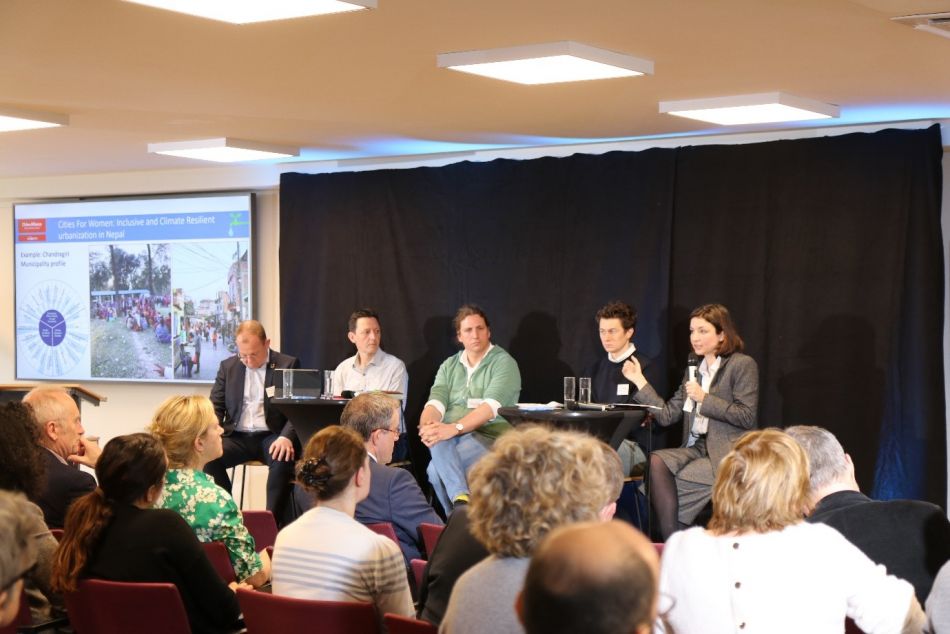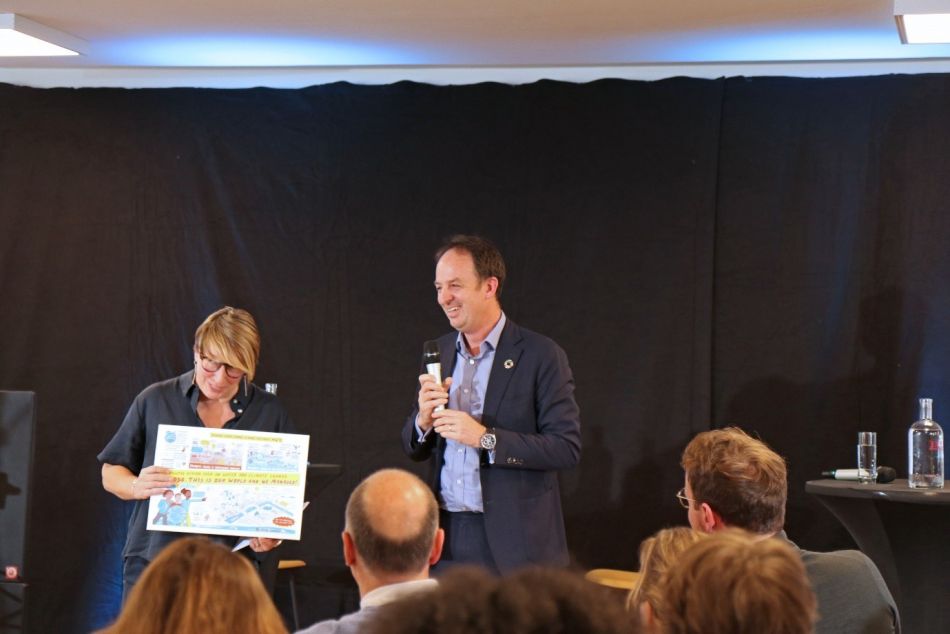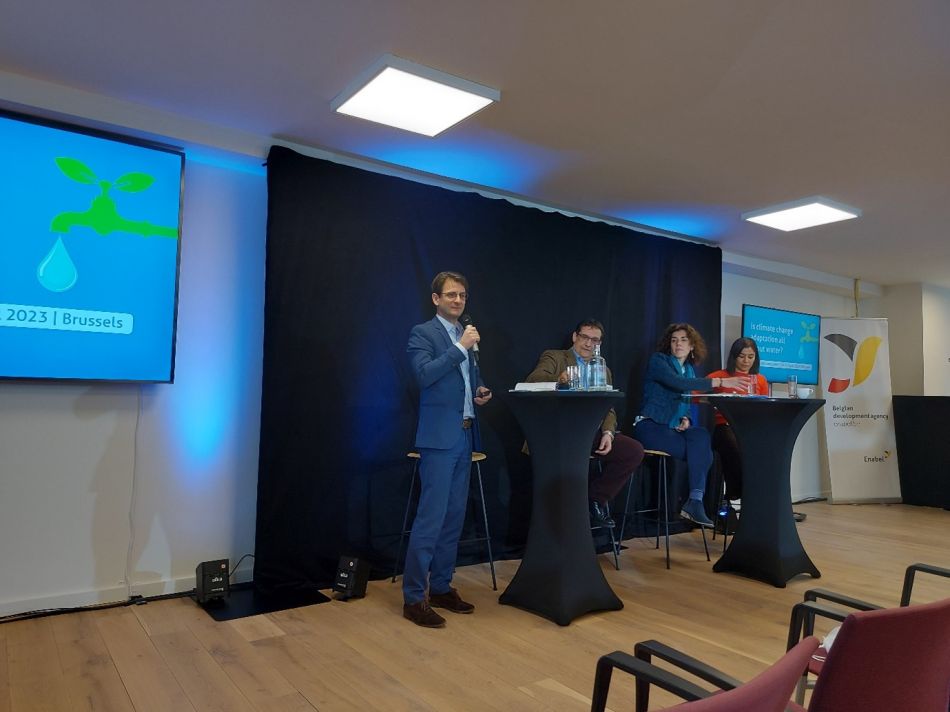Over 200 participants from 15 countries and three continents attended the international conference "Is climate change adaptation all about water?" in Brussels on 25 and 26 April. Although not everyone is aware of it, water - from shortage to excess - represents one of the biggest challenges of the next decades. Only by breaking silos, working together, transcending the local and developing international initiatives can we mitigate the disastrous impact of climate change on water resources. The call for a global, holistic approach was therefore strong at this congress.
The crucial role that water plays in all areas is becoming more apparent year by year. Periods of drought and flooding follow each other in quicker and quicker succession. Water that was never on the agendas until recently is now increasingly at the top of them. "Water can be a source of conflict, but more so a source of security once we manage it in a sustainable way," ambassador Luc Jacobs, Special Envoy for Climate and Environment, stated at the opening of the congress. "If water is a global issue, it needs global governance, but also a global planetary approach for financing its sustainable development."
Heidy Rombouts, Director-General of DGD, went beyond by stating the urgency of this conference: ”this is a conversation we need to have: to discuss expectations, input and, most-importantly, the way forward. We need to consider research and innovation, data and data quality, and the involvement of society, especially, youth.”
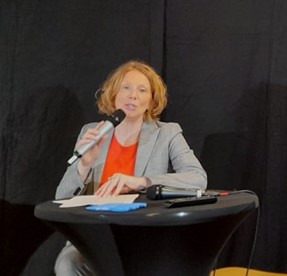
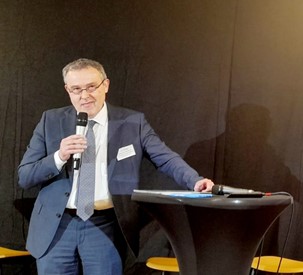
Heidy Rombouts, Director-General of DGD (left) and Luc Jacobs, Belgian Special Envoy for Climate and Environment (right) and during the opening session of the conference.
Nature-based solutions
"Our climate change is expected to cost 9.5 billion a year by 2050, that will be 2% of GDP," Steven Broeckx of VITO had calculated. Water is no longer a local problem, but a global one. However, to arrive at a supported water policy, many obstacles still need to be overcome. Sometimes solutions also present themselves in areas never thought of before. "Nature-based solutions were not the first choice to tackle climate change," clarified Martin Binon of Brussels Environment. "But it ended up as the serious solution to build full climate resilience."
But for that, you need a broad support base, thought Arnaut Ruelens of the City of Mechelen. "If society is not part of the policy process, they will not take up - or even hear about - our solutions." That water management also means people management did resonate more throughout the conference. Filip Lefebre of VITO therefore argued in favour of citizen science because it can ensure that general awareness is raised, and there is more engagement and responsabilisation. Monitoring is crucial and citizens can play a role there too. For Durk Krol of Water Europe, we need to establish water as one of the KPIs in policy and governance.
If water shortages are already looming in the West, they are already very concrete in developing countries. "There is a link between development and climate goals, but different tools for financing pose a conflict," Paulo Massinga of Enabel Mozambique testified. "The size of the problem is enormous, but there is unfortunately not enough finance to solve it.” To enable full access to water between 2020 and 2029, Mozambique needs €3.3 billion, and for that we need development partners." Giulia Maci of UNOPS, the UN Office of Support Services, pointed out that water scarcity in those countries has another effect: it increases gender violence against women because it is precisely the women in water-scarce regions who are the first to suffer. They are given the responsibility to replenish water resources but are rarely represented in water policies.
Just about all the speakers cited the problem of financing. "There are many challenges, but governance is definitely the biggest one. We need funding, yes, but it is governance that will ensure that these solutions are maintained even beyond implementation," Durk Krol concluded.
Water-Energy-Food-Ecosystem nexus
The WEFE nexus is about understanding and describing the interactions of water, energy, food and ecosystems, as well as an approach to synergies and trade-offs of competing uses. It is part of the solution we are looking for to the water problem. Arnaud de Vanssay of the Directorate-General INTPA.F2 raised some pressing questions. "We often define it as an optimisation approach, but is it really the objective to optimize the use? Shouldn't we instead minimise the impact on the water cycle? Another striking aspect that nobody talks about is the scale: is it local, regional or global scale? Can we really have an impact at all these scales? What do we want to achieve and what are the common goals?"
Cesar Carmona-Moreno, from the European Commission's Joint Research Centre, gave some answers, but immediately stated that many difficulties stem from political will. "If the problems are not perceived at the political level, there will be no discussions and no solutions," he said. "We address the nexus in two different ways: policy dialogue by collecting data, identifying priorities and problems to be solved, and developing scenarios versus intervention projects with concrete actions on the ground, analysing priorities and engaging in dialogue with stakeholders.
According to Petra Schmitter of IWMI, “we need to start looking at segmentation within the nexus, not in a negative way, but rather who needs what and what the implications are for everyone in the value chain along the pathway”. She advocates to move away from quotas and rethink food systems for a transition in agriculture.
In this whole process, however, there is a lack of consultation. "We realised that the different actors do not come together often enough. We need to bridge the gap between funders, policymakers and end users," Irene Sander of GIZ argued. This need was also expressed by other speakers. "Make sure that it is not only the scientists who have the understanding of the complexity of these interconnections, but also the bridge with policymakers and stakeholder priorities," also concluded Annika Schlemm of VUB.
Jean Van Wetter, Director-General of Enabel, summed it up and also pointed out another very current threat. "Access to water is a major inequality issue. There is a great risk of privatization of access to water. It is a human right, and we should never forget that." He further called for a collaborative governance approach to ensure inclusive decision-making.
Minister of Development Cooperation and Major Cities, Caroline Gennez, closed the two-day conference. Recent summers have brought us face to face with the reality of climate change. "How will we ensure that we have enough water for agriculture? How will we avoid floods? Not only here, but all over the world? The Belgian Development Cooperation is committed to social justice, to leave no one behind. It is therefore important to focus on the least developed countries because they are most affected by climate disasters."
The minister pointed out that water is a human right. "It is the most vulnerable communities that suffer the most from lack of sanitation, waterborne diseases and lack of access to water. Water is part of the work of all our actors: it involves investment and involvement of all stakeholders." To conclude, she encouraged collaboration. Not only with private partners, but also with government and all stakeholders.
The conference "'Is climate change adaptation all about water?" was organised by the Belgian development agency Enabel, the Directorate-General for Development Cooperation and Humanitarian Aid (DGD) of the Federal Public Service Foreign Affairs, Foreign Trade and Development Cooperation, and VITO (Flemish Institution for Technological Research).
International conference: "Is climate change adaptation all about water?"


